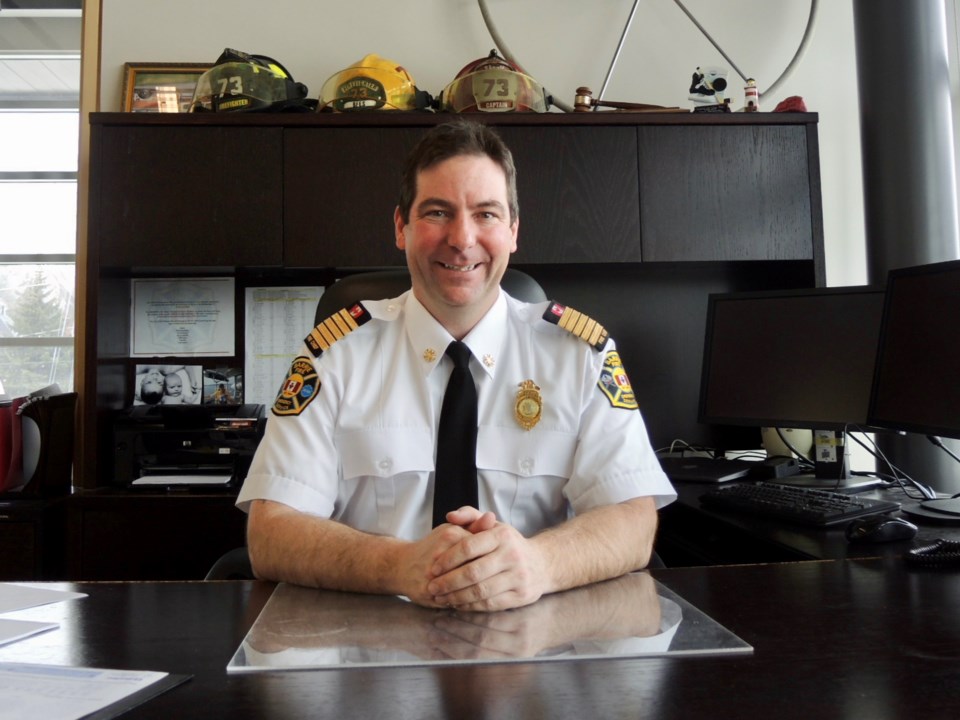Update: At general committee March 18, 2019, councillors were presented with two alternatives in Mainprize's report, including to declare the public health emergency. The other, which councillors endorsed, was to work with Simcoe Muskoka Opioid Strategy (SMOS) members to determine the most effective use of city resources. It will require final ratification at next week's city council meeting.
*****************************
Fire Chief Cory Mainprize says he doesn't believe declaring a public health emergency around Barrie's opioid crisis would have the effect city officials may be looking for.
Before the mayor decides whether to declare a public health emergency, council asked Mainprize earlier this month to weigh in on the implications and what that could mean. His report was included in a report to council ahead of tonight's general committee meeting.
"When a local emergency is called, there is significant draw on city resources, both human, physical and financial," Mainprize said.
In December 2018, there were 38 opioid poisoning emergency department visits at hospitals in Simcoe Muskoka, which was down from November which saw 66 visits to Simcoe Muskoka hospitals. The Simcoe Muskoka District Health Unit reported 28 visits to Barrie's Royal Victoria Regional Health Care for suspected drug overdose in the first 10 days of February.
Emergencies declared under Ontario’s Emergency Management and Civil Protection Act typically involve natural disasters such as storms or dangerous situations like a gas leak affecting a major portion of the community.
It is up to the head of council, Jeff Lehman in this case, to make the official declaration, or the premier of Ontario. It's also up to the mayor to declare the emergency over.
A field manager from the Office of the Fire Marshall and Emergency Management (OFMEM) told Mainprize that mitigating the emergency is the municipality's responsibility if declared locally.
These types of emergencies also normally have a defined start, such as the date of the natural disaster or accident, and finish, which would be a termination date when the municipality deems it can manage the incident on its own, the chief added.
If an emergency was declared in Barrie, the city would activate its emergency operations control group, which is comprised of senior staff as well as Barrie police. An incident action plan would be developed.
"The city does not provide health services itself and relies upon the Simcoe Muskoka District Health Unit and Royal Victoria Regional Health Centre for these services," Mainprize said. "Similarly, social services and paramedic services are provided by the County of Simcoe.
"The city’s emergency operations control group doesn’t have the training, resources, insights, etc., to contribute to developing an incident action plan for an opioid crisis that it would for a natural disaster type of emergency," he added.
The opioid crisis could also take a long time to fix, the chief noted.
"The timeline for addressing this type of emergency is anticipated to take years, rather than days or weeks," Mainprize said. "Declaring a local emergency will require a significant number of senior staff involved in emergency operations control group meetings with limited value added, over a substantial period of time.
"The specific amount of time required would not be known, until the plans are developed."
Mainprize also noted recent discussions have resulted in heightened awareness around the problem. Declaring an emergency could raise that level even more, but no other municipalities have taken that step.
"Should council decide to declare an emergency, it appears that Barrie would be the first of Ontario’s 444 municipalities to declare an emergency on this issue," he said, adding an OFMEM representative "did not see any benefit to a declaration," as there are several other municipalities facing a similar situation.
Barrie has the third worst opioid problem in the province for cities with more than 100,000 people.
Declaring an emergency does not trigger additional provincial funding and wouldn't improve the city’s ability to request resources, Mainprize said. The OFMEM also indicated the city has the right to request any resources from all the same agencies, with or without the declaration of an emergency.
Declaring an opioid emergency could also hinder the city's reputation.
"It is likely that being the first municipality in Ontario to declare a local emergency for the opioid crisis will generate a perception that the crisis in Barrie is worse than anywhere else in the province and will generate additional media coverage," said Mainprize, adding this could have a negative effect on business retention and attraction as well as tourism.
City officials have also heard that the opioid problem has already dissuaded people from going downtown, and declaring an emergency could make the perception even worse.


